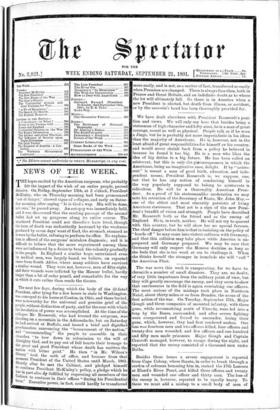We have dealt elsewhere with President Roosevelt's posi- tion and
views. We will only say here that besides being a statesman of high character and lofty aims, be is a man of great courage, moral as well as physical. People talk as if he were a Jingo, but be is probably not more imperialistic in his ideas than the majority of Americans. He is, however, not in the least afraid of great responsibilities for himself or his country, and would never shrink back from a policy he believed in because he found it too big. He is a man who likes the idea of big duties in a big future. He has been called an aristocrat, but this is only the picturesqueness in which the Americans, being an imaginative race, delight. If by " aristo- crat" is meant a man of good birth, education, and inde- pendent means, President Roosevelt is, we suppose, one, but that he has any notion of conducting himself in the way popularly supposed to belong to aristocrats is ridiculous. He will be a thoroughly American Presi- dent. As a proof of his statesmanlike moderation we may note his retention of the Secretary of fitate, Mr. John Hay,— one of the ablest and most sincerely patriotic of living American statesmen. That act is a sign of the new Presi- dent's breadth of vision and strength. People have described Mr. Roosevelt both as the friend and as the enemy of England. He is, in truth, neither. . He will not try to quarrel with this country, but he will show her no special favours.• The chief danger before him is that in insisting on the policy of
hands off " he may come into violent collision with Germany, and that this collision may take place while America is un- prepared and Germany prepared. We may be sure that Germany will only respect the Monroe doctrine as long as she feels that she is too weak at sea to challenge it. When she thinks herself the stronger in ironclads she will " call " the American Fleet.






































